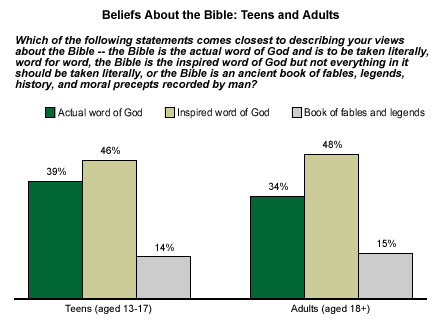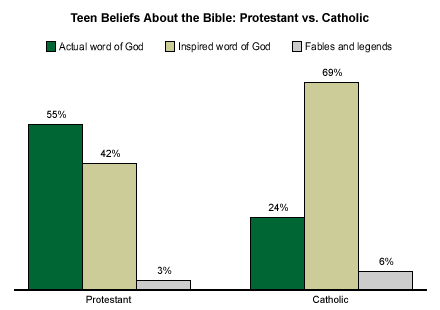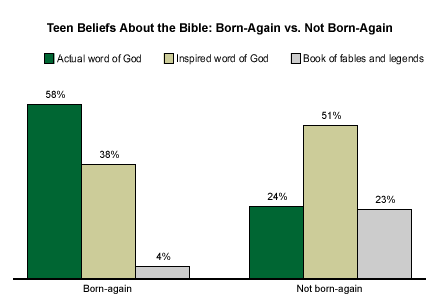Conventional wisdom maintains the teen years are a time of rebellion, when teens tend to question authority and challenge norms. But when it comes to teens' beliefs about the Bible, it seems U.S. teens buck that conventional wisdom.
According to the most recent ║┌┴¤═° Youth Survey*, teenagers express views about the Bible that are similar to those of adults. Thirty-nine percent of teens say the Bible is the "actual word of God" and should be taken literally, 46% say the Bible is the "inspired word of God" but not everything should be taken literally, and 14% say the Bible is an "ancient book of fables, legends, history, and moral precepts recorded by man." Similarly, a November 2004 ║┌┴¤═° Poll** shows 34% of adults say the Bible is the actual word of God, 48% say the Bible is the inspired word of God, and 15% say the Bible is an ancient book of fables and legends.

Protestant and Catholic Teens
While Protestant and Catholic teens alike hold that the Bible is the word of God (only 3% of Protestant teens and 6% of Catholic youth believe the Bible is a book of fables and legends), there are wide differences between the two groups on whether the Bible is the actual or inspired word of God. Fifty-five percent of Protestant teens believe the Bible is the actual word of God, compared with only 24% of Catholic youth. In contrast, 69% of Catholic teens believe the Bible is the inspired -- but not literal -- word of God, as do 42% of Protestant teens.

The basic differences between Catholic teachings and Protestant teachings about the Bible may explain differences between Catholic teens' and Protestant teens' views of it. In Roman Catholicism, church tradition stands alongside the Bible as an authoritative source on the Christian faith. While the Bible is believed to be "inerrant," inerrancy does not mean literalism. The inerrancy is in the inspiration and revelation of the message contained in the Bible and as interpreted by the Catholic Church -- not in the actual words.
Protestantism, on the other hand, is far more wide-ranging in its interpretation of the Bible, with most traditions claiming the primacy of the Bible above all else -- sola scriptura, as Martin Luther asserted. However, there's no single "Protestant" outlook on how the Bible should be interpreted. Many Protestant traditions are literalist in their views of the Bible, but others view the Bible as the work of man. Still other Protestant traditions lie somewhere between the two extremes. Protestant teens do not all receive the same teaching from their churches on the Bible, as Catholic youth do.
Born-Again Teens
Teens who claim to be "born-again" Christians are more likely to believe the Bible is the actual word of God -- 58% make that assertion. Only 24% of teens who do not identify as born-again Christians see it that way.

Church Attendance
The more frequently teens attend church, the more likely they are to believe the Bible is the actual word of God. Fifty-eight percent of weekly church attendees, 43% of nearly weekly or monthly attendees, and 18% of teens who seldom or never attend church believe the Bible is the actual word of God. Conversely, 31% of teens who seldom or never attend church believe the Bible is a book of fables and legends, compared with just 3% among weekly attendees and 6% among nearly weekly or monthly attendees.
Bottom Line
While there is some variation in American teens' beliefs regarding the Bible's origin, there's a strong degree of consensus that God had a hand in its creation. Even among teens who are not born-again or who seldom attend church, the Bible is considered by most to be the word of God: 76% of teens who are not born-again Christians say the Bible is either the actual or inspired word of God, and among those who seldom or never attend church, that percentage is 66%.
*These results are based on telephone interviews with a randomly selected national sample of 1,028 teenagers in the ║┌┴¤═° Poll Panel of households, aged 13 to 17, conducted Jan. 17 to Feb. 6, 2005. For results based on this sample, one can say with 95% confidence that the maximum error attributable to sampling and other random effects is ±3 percentage points. In addition to sampling error, question wording and practical difficulties in conducting surveys can introduce error or bias into the findings of public opinion polls.
